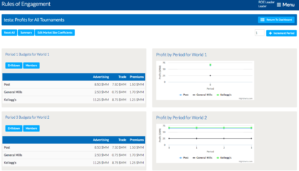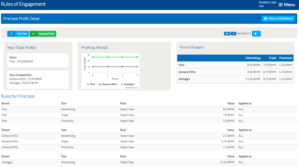
Almost all business school students study strategy and game theory; however, these outwardly simple theories can often be difficult to apply to real world situations. Rules of Engagement (ROE) is designed specifically to allow students to try differing strategies in a realistic and highly competitive commercial environment.
In Rules of Engagement, the Learning Lab has collaborated with premiere Wharton professors Peter Fader, Robert Meyer, and David Reibstein, to demonstrate the intricacies of game theory when played in an iterative, competitive market space. Students assume the role of major breakfast-cereal manufacturers by strategizing on and setting “rules” that will govern future marketing expenditures – then they and watch as their plans unfold and the competition heats up.
After an in-class discussion provides the background on marketing and advertising strategy, each team sets their company’s marketing budget for the initial year and selects the strategic rules that will be used to automatically set the budget for future years (allowing the professor to simulate the effect of these strategies over a long-range time period).
The students  can then see how their strategies play out against one another over time, while the administration module enables the game’s facilitators to display results in graphical or numerical format, in addition to drilling down core concepts in a specific scenario.
can then see how their strategies play out against one another over time, while the administration module enables the game’s facilitators to display results in graphical or numerical format, in addition to drilling down core concepts in a specific scenario.
Moreover, Rules of Engagement illustrates the age-old “Prisoner’s Dilemma,” wherein each player has choices but must make decisions in a vacuum, not knowing what the competition will do.
Multiple competitors that emerge throughout the course of gameplay, as well as an unknown number of iterations at the outset add to the simulation’s complexity while ensuring that students can truly see the effects of their strategies not only on their companies, but on the industry as a whole. Rules of Engagement is also used by Wharton faculty to illustrate to the characteristics of successful and effective marketing strategies.
Administrative Tools
The real advantage that Rules of Engagement brings to teaching and learning is the flexibility of the administrative tools. These tools allow faculty to demonstrate both tacit cooperation and the “big picture” of market competition using the following features:
- Drilldown: The simulation can handle multiple tournaments running consecutively. The faculty member can choose to drill down on some of the more interesting tournaments to explain specific teaching points.
- Rule Editing: As in the real world, teams can choose to change their rules once they see the effects of their original rules. The faculty mem
 ber has the ability to input these rule changes and run the simulation out again to see if there are any new effects.
ber has the ability to input these rule changes and run the simulation out again to see if there are any new effects.
- Reset: The faculty member can choose to reset a single tournament or an entire game. When used in conjunction with the ability to edit rules on the fly, this feature can be one of the most powerful teaching tools in Rules of Engagement.
To learn more about Rules of Engagement, email the Learning Lab team at learninglab@wharton.upenn.edu.


